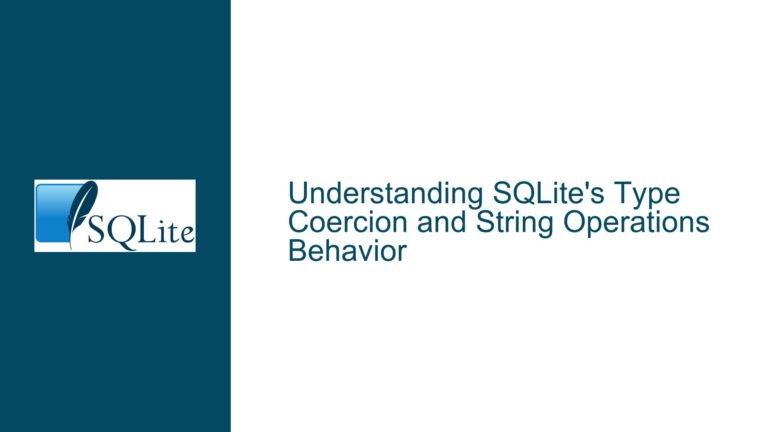Unexpected Behavior of Non-Deterministic Functions in SQLite Queries
Understanding the Unexpected Results of Random Number Filtering
The core issue revolves around the behavior of non-deterministic functions, specifically random(), in SQLite queries. When random() is used in a subquery and filtered in an outer query, the results often defy expectations. For instance, a query designed to filter out negative numbers may still return negative values, even though the outer query explicitly filters for n > 0. This behavior is not only counterintuitive but also raises concerns about the consistency and predictability of SQLite’s handling of non-deterministic functions.
The problem becomes more pronounced when considering the implications for other non-deterministic functions or user-defined functions with side effects. If random() behaves unpredictably, it suggests that other functions with similar characteristics might also produce unexpected results, potentially leading to bugs or data inconsistencies in applications relying on SQLite.
The Mechanism Behind Non-Deterministic Function Evaluation
The root cause of this behavior lies in how SQLite evaluates non-deterministic functions within queries. When a function like random() is used in a subquery, SQLite does not guarantee that the function will be evaluated only once per row. Instead, the function may be re-evaluated multiple times during the query execution, leading to different results even within the same row. This behavior is particularly evident in queries where the same function is referenced multiple times, such as in the case of SELECT n as n1, n as n2 FROM (SELECT random() as n FROM t).
The SQLite documentation on the "Generation of the set of result rows" suggests that each result row is calculated by evaluating the expressions in the result expression list with respect to a single row of input data. However, this does not necessarily imply that non-deterministic functions are evaluated only once per row. Instead, the function may be re-evaluated for each reference, leading to the observed inconsistencies.
This behavior is not unique to SQLite. Other databases, such as MySQL, exhibit similar issues with non-deterministic functions. However, databases like PostgreSQL handle non-deterministic functions differently, ensuring that functions like random() are evaluated only once per row, which aligns more closely with user expectations.
Addressing the Issue: Solutions and Best Practices
To mitigate the unexpected behavior of non-deterministic functions in SQLite, several strategies can be employed. One effective approach is to use a MATERIALIZED common table expression (CTE) as an optimization barrier. By materializing the subquery, the results of the non-deterministic function are stored and reused, ensuring consistency across multiple references. For example:
CREATE TABLE t (name TEXT);
INSERT INTO t VALUES ('a'), ('b'), ('c');
WITH r(n) AS MATERIALIZED (SELECT random() FROM t)
SELECT n FROM r WHERE n > 0;
This approach ensures that the random() function is evaluated only once per row, and the results are stored in the materialized CTE. Subsequent references to n in the outer query will use the stored values, eliminating the inconsistencies caused by multiple evaluations.
Another strategy is to explicitly cast the result of the non-deterministic function to a specific data type, such as INTEGER, before filtering. While this does not address the underlying issue of multiple evaluations, it can help ensure that the results are consistent with the expected data type. For example:
SELECT n FROM (SELECT CAST(random() AS INTEGER) n FROM t) WHERE n > 0;
However, it is important to note that this approach does not guarantee that the function will be evaluated only once per row, and the results may still vary depending on the query execution plan.
In cases where the behavior of non-deterministic functions is critical to the application’s logic, it may be necessary to reconsider the use of such functions or to implement additional safeguards to ensure consistency. For example, instead of relying on random() directly within the query, the application could generate the random values externally and insert them into the database as part of a separate step. This approach ensures that the values are consistent and predictable, even if it requires additional processing outside of SQLite.
Finally, it is essential to thoroughly test any queries involving non-deterministic functions, especially in complex queries with multiple subqueries or joins. By understanding the behavior of these functions and the potential pitfalls, developers can design more robust and reliable applications that leverage SQLite effectively.
In conclusion, the unexpected behavior of non-deterministic functions in SQLite queries is a nuanced issue that requires careful consideration and strategic handling. By employing techniques such as materialized CTEs, explicit type casting, and external value generation, developers can mitigate the risks associated with these functions and ensure more predictable and consistent query results.






